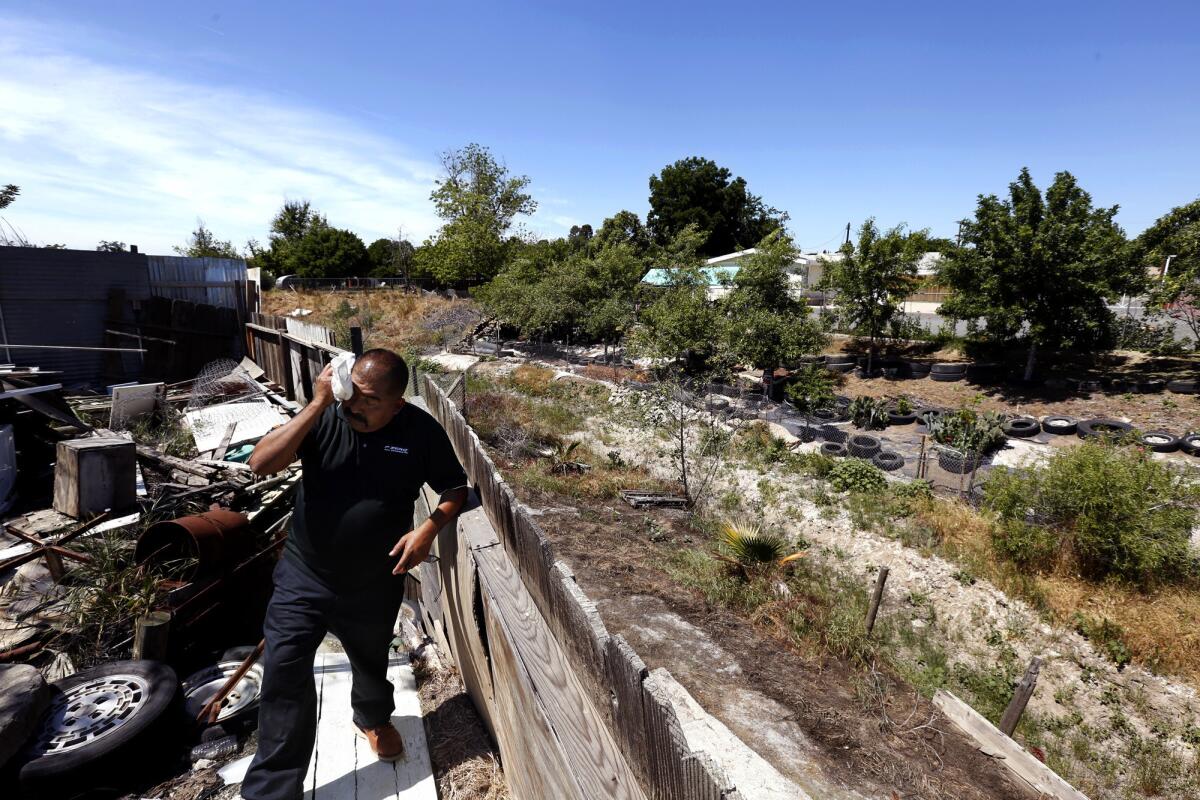Sen. Dianne Feinstein pushes Senate subcommittee for water bill to address California’s drought

- Share via
Reporting from Washington — El Niño’s rains didn’t end California’s drought, and Sen. Dianne Feinstein urged Senate colleagues Tuesday to hurry and find a compromise on a package of bills to address the water crisis in the West.
“There appears to be no immediate end in sight,” Feinstein said. “The drought is going to continue through next year.”
Feinstein testified Tuesday before the Senate Energy and Natural Resources Committee’s Water and Power Subcommittee about her proposal, which includes short-term drought relief for California and long-term water projects for more than a dozen Western states.
The bill attempts to respond to the Golden State’s water crisis, balancing preserving waterways and protecting endangered species such as the Delta smelt in the north against agricultural needs and drying wells in the Central Valley and Southern California.
California’s congressional delegation has long wrangled with what role the federal government should play in addressing the state’s water issue.
The 184-page bill does not mandate how much water should be pumped from the Central Valley Project or the State Water Project, which each move water from Northern California to farms and cities in the south. Those decisions would be left in the hands of state and federal officials.
For the short term, the legislation includes provisions aimed at capturing water from winter storms. It would allow water agencies to increase pumping for more of the year, and they would no longer be required to pay back the increase by reducing pumping later.
For long-term water needs, Feinstein’s bill proposes $1.3 billion for Western states for desalination, recycling and storage.
Her proposal is one of several drought bills the Senate is considering. The subcommittee on Tuesday did not act on the bill.
Energy and Natural Resources Committee Chairwoman Lisa Murkowski (R-Alaska) has indicated that she wants a water bill that would benefit all the Western states facing a drought, and several subcommittee members spoke Tuesday about compiling various proposals to create a comprehensive water bill.
House Republicans passed their proposal to address California’s water needs last year. The bill, sponsored by Rep. David Valadao (R-Hanford), focuses on funneling more water to San Joaquin Valley growers by reducing the amount used to support endangered fish populations.
“The House has passed a bill that I don’t believe, candidly, can pass the Senate. So, our goal has been to craft legislation that could pass the Senate and then hopefully be able to conference with the House,” Feinstein told the subcommittee.
House Majority Leader Kevin McCarthy said when Feinstein’s bill was filed in February that he hoped the Senate would pass it so the House and Senate could meet to reconcile the two plans. But the full Senate has not taken up her proposal.
California’s House Democrats are not all on board with Feinstein’s newest attempt.
Rep. John Garamendi (D-Walnut Grove) on Tuesday filed House Resolution 5247, which is identical to Feinstein’s measure. But eight Bay Area Democrats, along with members from Oregon and Washington, released a statement saying they have major concerns with the bills.
“This legislation’s modification of environmental laws not only sets a troubling precedent, but also pressures federal and state agencies to increase diversions from an increasingly damaged ecosystem that is close to a devastating collapse,” the statement read.
The lawmakers also said they oppose the Senate passing Feinstein’s bill and reconciling it with Valadao’s, saying “any legislation that emerges from a conference would not be acceptable to many of the diverse stakeholders in our home states.”
The federal agencies and advocacy groups testifying Tuesday called the proposal a good step forward.
Bureau of Reclamation Commissioner Estevan Lopez told the subcommittee Tuesday that the bureau was “confident and comfortable with the measured approach” in Feinstein’s bill. But in his written testimony to the committee, Lopez warned that the bureau was concerned the bill’s text contains ambiguities that could lead to new lawsuits over the Endangered Species Act.
He said in the testimony that Feinstein’s bill codifies the flexibility the bureau already has authority to exercise regarding pumping levels during droughts, it doesn’t add to it. He also said the bureau would probably oppose efforts to add additional room to maneuver within the Endangered Species Act to make Feinstein’s bill more like Valadao’s.
Timothy Quinn, executive director of the Assn. of California Water Agencies, told the committee that the nearly 430 public agencies he represents see Feinstein’s bill as headed in the right direction.
The amount of water that might be retained if Feinstein’s bill becomes law, he said, was “a good down payment on California’s drought.”
Dan Keppen, executive director of Family Farm Alliance, which advocates for access to water for irrigation, urged Congress to reconcile the Feinstein and Valadao bills.
“Two separate bills are of absolutely no value to a parched West,” he said. “What is needed is a single bill that can be enacted by Congress and signed into law by the president.”
Follow @sarahdwire on Twitter
Read more about the 55 members of California’s delegation at latimes.com/politics
ALSO:
California looks at easing drought cuts after wet winter
Feinstein water policy bill could signal a compromise in sight
Updates on California politics
More to Read
Get the L.A. Times Politics newsletter
Deeply reported insights into legislation, politics and policy from Sacramento, Washington and beyond. In your inbox three times per week.
You may occasionally receive promotional content from the Los Angeles Times.











